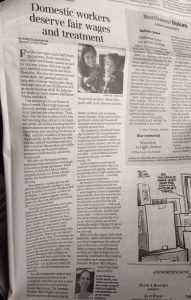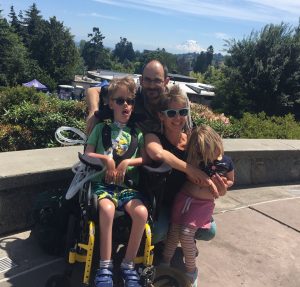Famous again: Krista’s op-ed about Lucas and his nurses
 An op-ed that Krista wrote in support of the Domestic Workers Bill of Rights was published in the Seattle Times this weekend. She’s gotten great feedback on it (notwithstanding the usual haters on the Seattle Times website) and it’s amazing to hear how many people have stories of their own about the importance of home nurses, caregivers, and other domestic workers. (And its also amazing how many people still read the Seattle Times in print.)
An op-ed that Krista wrote in support of the Domestic Workers Bill of Rights was published in the Seattle Times this weekend. She’s gotten great feedback on it (notwithstanding the usual haters on the Seattle Times website) and it’s amazing to hear how many people have stories of their own about the importance of home nurses, caregivers, and other domestic workers. (And its also amazing how many people still read the Seattle Times in print.)
Lucas is taking it all in stride, of course. He reminds everyone that he was already famous, and in fact this is the third time he’s had his photo and story in the Seattle Times; the first time was for a story about the Affordable Care Act and people who have benefited, and the second time a “one-year later” follow up to the first. The other night he said matter-of-factly “people probably even know about me in other countries now.” All of this was a good distraction since Lucas has been sick for the past week and even had to miss school for the last few days of the year.
 We finally got him off the couch on Sunday and went down to check out the Arctic Sunrise, the Greenpeace boat docked in Lake Union. Since the tour wasn’t accessible for people in wheelchairs they had a virtual reality station set up — and Lucas loved it! He now wants to do VR all the time.
We finally got him off the couch on Sunday and went down to check out the Arctic Sunrise, the Greenpeace boat docked in Lake Union. Since the tour wasn’t accessible for people in wheelchairs they had a virtual reality station set up — and Lucas loved it! He now wants to do VR all the time.
Anyway, if you’re interested in the campaign for a Domestic Workers Bill of Rights you can learn more from the organization Casa Latina and sign this petition.
Here’s the Seattle Times Op-ed:
Domestic workers deserve fair wages and treatment

A Domestic Workers’ Bill of Rights and a standards board would ensure domestic workers in Seattle have the protections and pay that many workers enjoy.
For the last eight and a half years, my partner, Burke Stansbury, and I have hired home nurses to care for our son, Lucas, who has significant medical-care needs due to his disability. We also are parents to one other child. My partner and I are only able to keep regular jobs, sleep and take care of our children as well as we do because of all the help we get from our son’s nurses, Katharine, Alisha and Mark.
Our nurses are in our home six days a week. They help Lucas get dressed, provide medical care and help him into his wheelchair. Then, they ride the bus to school with him. All day long they attend to his medical needs, including keeping him fed and hydrated through his tube feeding system and assuring his airway is clear. and his ventilator is functioning properly. In the afternoon, they ride the school bus home with him and continue his medical care while also setting up his personalized computer system so he can do his homework.
We also are fortunate to have someone who comes two mornings a month to clean our house. While we live in Seattle’s Mount Baker neighborhood, our house cleaner works for families all over King County.
As a parent, worker and an employer of domestic workers, I support Seattle’s Domestic Workers’ Bill of Rights. I believe that workers in the home deserve dignity and respect for the role they
Having people work in our home, especially our nurses doing such intimate and life-sustaining work, has made me deeply aware of our interdependence. Before we had kids, Burke and I imagined living in an intentional community with other families, so that our kids would have close relationships with lots of adults. Although we haven’t been able to do that, I sometimes see our relationships with our nurses as another kind of intentional community. Though it’s forced, these relationships are also beautiful. A Domestic Workers’ Bill of Rights in Seattle would help ensure that the employer-worker relationship is beautiful — or at the very least fair and just — for all workers and employers.
Too often domestic workers face discrimination and abuse in the workplace, and that can lead to poor quality of care for our loved ones — people like my son. The Domestic Workers’ Bill of Rights and a standards board would ensure that domestic workers such as nannies, house cleaners, home care workers, gardeners, cooks and household managers have the protections most workers already have.
The legislation introduced Thursday by Seattle City Councilmember Teresa Mosqueda would require employers and domestic workers to have a written contract, and the city would convene a standards board — with employees and employers at the table — to determine industry standards like pay, overtime, breaks, etc.
A Bill of Rights would help all domestic workers ensure that they are treated with dignity, and they would help ensure high-quality care for those we love most — our kids, parents and grandparents.
My family is so fortunate to have home nurses helping us raise our self-confident, curious, hilarious kid — who happens to have a disability that radically alters the ways he can move and interact with the world. We literally couldn’t live the full lives that we get to live — with quality and meaningful relationships for each of us as parents, and for each of our kids — without our nurses. We are so deeply grateful for their work, both in taking care of him medically and for helping him grow into the beautiful, confident kid he has become.
When I see the respect with which Katharine, Alisha and Mark treat my son, I truly experience the value of care in the home. It reinforces my desire to ensure that all domestic workers are acknowledged for the powerful contribution they make to our families and communities. A Domestic Workers’ Bill of Rights would help make that a reality.

Krista Hanson is a Seattle parent, yoga teacher and advocate who works to support families of children with disabilities and chronic health conditions.




